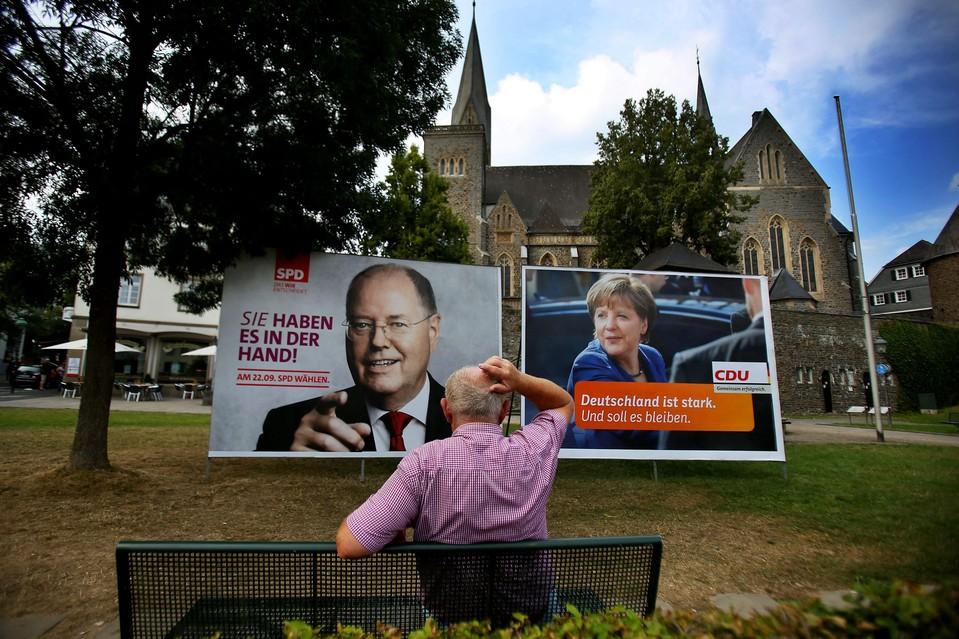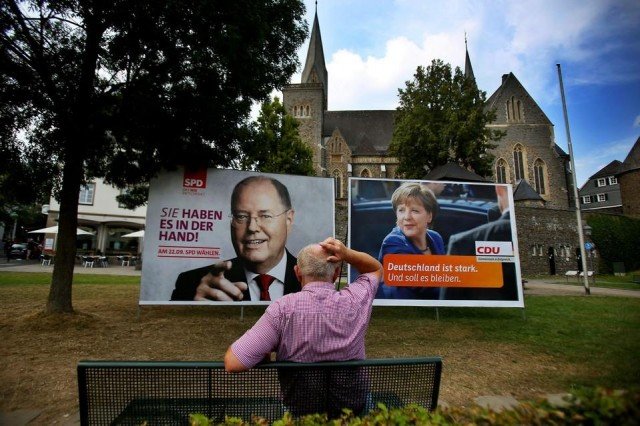
Germany’s rival parties, CDU and SDP, are in their final day of campaigning ahead of Sunday’s parliamentary elections.
Polls suggest Chancellor Angela Merkel’s Christian Democratic Union (CDU) will win the biggest share of the vote.
But her current coalition partners, the Free Democrats, may not pass the 5% threshold for winning seats in parliament.
If so, Angela Merkel may have to consider a coalition with her main rival Peer Steinbrueck’s Social Democrats (SDP).
Angela Merkel is holding a large rally in Stralsund and Peer Steinbrueck is due to appear at an event in Frankfurt.
Addressing a CDU rally in Hanover on Friday, Angela Merkel asked for votes to continue with her government’s policies into 2017.
“Please vote for the CDU on Sunday, so that we can continue our solid policy for you, for your children, for your families and friends,” she said.
“So that in four years we are able to say that people in 2017 are doing better than they did in 2013; more people have jobs; the euro is more stable, Europe is more stable and we have less debt. This is my goal, ladies and gentlemen, and therefore I ask you for your support.”
Peer Steinbrueck – whose opposition SDP party is trying to deny Angela Merkel a third term – rallied his supporters in the town of Kassel. Peer Steinbrueck has sharpened his attacks on his rival, accusing her of skirting the country’s big challenges.
He touched on the crisis in Syria, saying he did not want German involvement in any military action. But he said peacekeeping could not be ruled out.
“Germany will have to, within its alliances and under the conditions of a mandate, take part in peacekeeping and peace securing measures,” Peer Steinbrueck said.
The Green Party – who may play some part in an eventual governing coalition – held a rally in Berlin. The party’s parliamentary co-chair, Juergen Trittin, criticized Angela Merkel’s government.
“Two parties went into the election campaign saying: <<We will not increase taxes>>. Then they started their term with a 3% VAT increase. Then they ended it with the car trade-in rebate scheme that was environmental, industrial and transport policy madness,” he said.

Angela Merkel’s current coalition partners, the Free Democrats, rallied for votes in Stuttgart.
The Free Democrats (FDP), whose best-known member is Foreign Minister Guido Westerwelle, has seen its fortunes decline sharply since the last election in 2009, when it won nearly 15% of the vote.
Analysts say the party, traditionally more liberal than the CDU/CSU, has struggled to stand out from its more powerful coalition partner on economic policy.
If the Free Democrats (FDP) do badly, as expected, the Christian Democrats (CDU/CSU) may find themselves looking to other small parties to form a broader, more fragile coalition.
According to an average of opinion polls tweeted by the London-based @electionista monitoring site, the CDU/CSU will get 38.6% of the vote to 25.8% for the SPD and 6.4% for the FDP.
Some analysts also see the possibility of a government led by Angela Merkel which includes the Social Democrats, whose leader served as finance minister under Merkel in a previous grand coalition.
Under another scenario, a new party largely formed from disaffected CDU members could get enough votes to be regarded as a different coalition partner. Alternative fuer Deutschland (AfD), as it is known, is avowedly anti-euro and could prove a difficult partner.
In a letter sent to five million households, Angela Merkel, in power since 2005, promised voters they would be in safe hands if she stayed on as chancellor.
“We have achieved a lot together,” she wrote.
“I also want the next four years to be good.”
On Berlin’s famous Alexanderplatz Square on Thursday evening, Peer Steinbrueck likened Angela Merkel to a timid driver steering the country around in circles.
“She likes to drive around roundabouts,” he said.
“That way you don’t hit anything… You drive without accidents.
“But the moment you set a direction, the moment you don’t just administer this country but also decide its political direction, you also cause offence, you provoke. At least with me you know what you get, in contrast to the last four years.”
Dismissing opinion polls, Peer Steinbrueck said: “It’s not the pollsters, nor the wishful thinking of politicians… but you voters who decide.”
The election is one of the most important in years because of Germany’s dominant role in the eurozone.
With the biggest population of any EU state, Germany enjoys a GDP that far outstrips the economies of its partners and is crucial to decisions on tackling the eurozone’s debt crisis.
[youtube JWFLkrmsXTA]